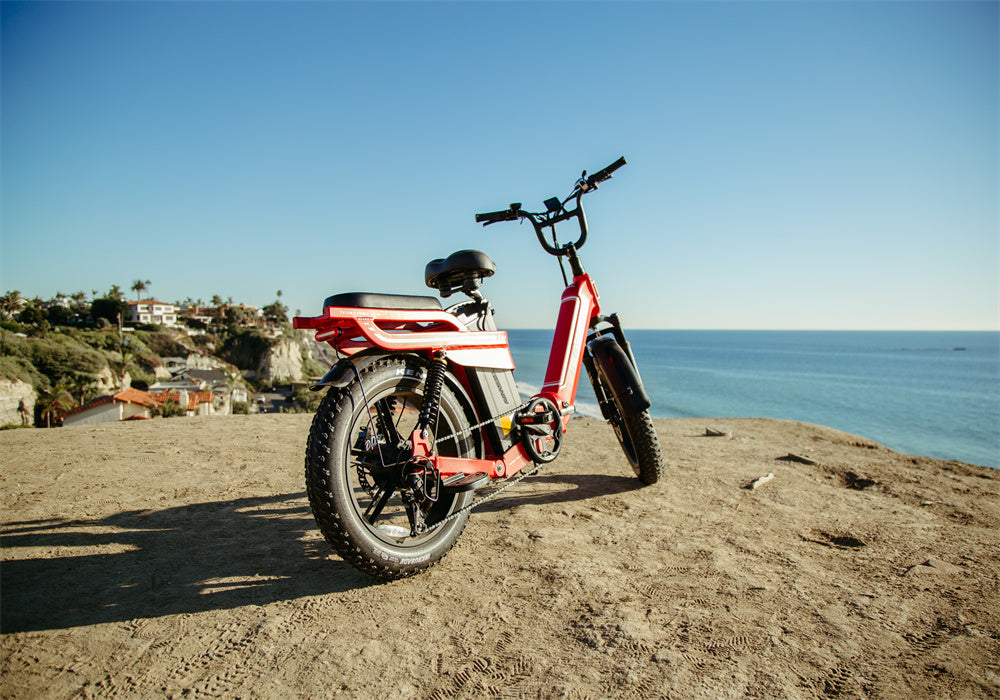The weight of an electric bicycle is a crucial factor that affects multiple aspects of its performance.
Unlike traditional bicycles, e-bikes have an added motor and battery that contribute to their overall weight.
Understanding how weight influences various aspects of the bike's functionality is essential for any rider.
Why Does Electric Bike Weight Matter
1. Ride Comfort and Handling
One of the most noticeable effects of bike weight is its impact on ride comfort and handling.
Lighter electric bikes are typically easier to maneuver, especially when navigating tight spaces or making sharp turns.
This makes them ideal for urban commuting or recreational rides on paved roads.
Heavier models, however, may provide more stability on rougher terrains, giving riders confidence during off-road adventures.
2. Pedal Assist and Motor Strain
The motor of an e-bike is designed to assist you with pedaling, reducing the effort required to ride.
Heavier bikes can put additional strain on the motor, leading to potential overheating or reduced efficiency over time.
Lighter electric bikes tend to have less strain on the motor, allowing it to run more efficiently and last longer.
If you're using the bike for long-distance rides or in areas with lots of hills, a lighter bike will be more efficient in terms of energy consumption.
3. Storage and Portability
For many riders, the weight of the bike also affects how easily it can be stored or transported.
If you plan to store your e-bike in tight spaces or need to lift it onto a bike rack in your car, a lighter model will make your life easier.
On the other hand, heavier bikes can be cumbersome and may require more effort to move around, which could be a dealbreaker for some people.
4. Battery Life and Range
Interestingly, the weight of an electric bike can also influence its battery performance and range.
While lighter e-bikes may use smaller batteries, they often achieve better mileage due to reduced overall weight.
A heavier electric bike may come with a larger, more powerful battery that allows for longer rides, but the extra weight can diminish the benefits of that additional power.
If your main priority is a long-range electric bike, balancing weight and battery size will be key to ensuring the bike’s efficiency over long distances.
SEE ALSO Hub Motors vs. Mid Drive Motors: Which ElectricBike Motor is Right for You?
Lightweight vs. Heavy E-Bikes
Choosing between a lightweight electric bike and a heavier electric bike comes down to your personal needs and preferences. Here’s a closer look at both options.
Lightweight Electric Bikes: Pros and Cons
Pros:
-
Easier to maneuver: Ideal for urban commuting or light recreational riding.
-
Better efficiency: With less weight, the motor doesn’t work as hard, leading to greater battery efficiency and potentially longer range.
-
Easier to store: Perfect for those who need to carry the bike on public transportation or store it in compact spaces.
-
Increased comfort: Typically more agile and comfortable on smooth roads.
Cons:
-
Less stability: May not perform as well on rough, uneven terrain or in windy conditions.
-
Lower load capacity: Lighter bikes may not be as capable of carrying heavy riders or large loads.
Heavy Electric Bikes: Pros and Cons
Pros:
- Better stability: Ideal for rough or off-road terrain where more weight helps the bike maintain its balance.
- Larger batteries: Often come with bigger batteries that can provide a longer range, especially on more challenging rides.
- Increased durability: Designed to handle more challenging environments, including steep hills and rugged paths.
Cons:
- Harder to maneuver: May be cumbersome in city environments or during short commutes.
- More difficult to store: A heavy bike can be tough to lift and store, particularly in small apartments or car trunks.
- Increased motor strain: The added weight can cause the motor to overheat faster, especially on longer rides.
How to Choose the Best Electric Bike Based on Weight
Consider Your Intended Use
If you're looking for a bike that will handle daily commuting on smooth city roads, a lightweight e-bike might be the best choice.
On the other hand, if you plan to use your bike for mountain biking or off-road adventures, a heavier bike with added durability and larger tires might be more appropriate.
Factor in Storage and Transport Needs
For those who need to transport or store their e-bike in limited space, a lightweight electric bike will be more convenient.
It will be easier to lift, carry, and store, especially if you’re using public transportation or have limited garage space.
Balance Weight and Battery Life
If your priority is long-range electric biking, look for a bike that strikes a balance between weight and battery life.
Heavier bikes typically offer better battery capacity, but they may be less efficient due to their increased weight.
Lighter bikes may have smaller batteries but can still achieve longer ranges due to lower overall weight.
Tesway Cargo Electric Bike: The Ultimate Heavy-Duty Solution
If you’re looking for a reliable, heavy duty electric bike, the Tesway cargo electric bike might be exactly what you need.
Built for riders who require extra stability and capacity, it’s perfect for carrying heavy loads, making it an ideal choice for errands, deliveries, or family transport.
With a robust motor and a long-range electric bike battery that can take you up to 200 miles, it’s built to go the distance.
While its weight may not make it the most portable option, its performance and durability make it a fantastic investment for those seeking power and versatility in one.
FAQs
How much should an electric bike weigh?
The ideal weight for an electric bike depends on your needs. Light e-bikes can weigh between 35-50 lbs, while heavier models may exceed 60 lbs. For commuting, a lighter bike is generally preferred, while for off-road riding, a heavier model might be more appropriate.
Does a heavier electric bike have more power?
Not necessarily. While heavier bikes often come with larger batteries, the motor power doesn't directly correlate with the weight. Lighter bikes can still offer excellent performance with efficient motors and battery systems.
Can I lift a heavy electric bike?
While heavier electric bikes can be challenging to lift, many models have built-in features like step-through frames or foldable designs that make lifting and storing the bike easier. However, if portability is important to you, consider opting for a lighter model.
Read More
7 Health Benefits of Cycling
Why Commuting by Ebike is a Smart Financial Decision
10 Best Road Biking Trails in Ottawa
Reasons You Should Consider an E-bike to Commute
Can You Ride a Bike on the Sidewalk in Canada?









Share:
Electric Bike Battery Fires: What’s Inside and How to Stay
How Fast Can A 3000w Ebike Go In Canada?